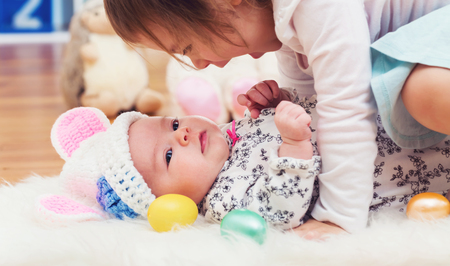Understanding Typical Speech and Language Development in the First Year
As a first-time dad living in the UK, I quickly learned that tracking your baby’s speech and language development is something every parent thinks about – especially in those whirlwind first twelve months. While every child grows at their own pace, there are some general milestones most little ones hit during their first year. Knowing what to look out for can help you spot any early warning signs of delays.
Milestones to Expect in the First Year
| Age | Speech & Language Milestone | UK Parent Tips |
|---|---|---|
| 0-3 months | Cooing, making gurgling sounds, turning towards familiar voices | Respond with gentle talk; try classic nursery rhymes like “Twinkle Twinkle Little Star” |
| 4-6 months | Babbling with different sounds (ba-ba, da-da), responding to own name | Sing “Wind the Bobbin Up” or chat during nappy changes to encourage response |
| 7-9 months | Imitates sounds, understands “no”, enjoys interactive games like peekaboo | Read picture books together, use sing-song voices common in British nurseries |
| 10-12 months | Says simple words (“mama”, “dada”), points to objects, follows simple directions | Use everyday routines – like bath time songs – for learning new words |
The Role of Local Routines and Rhymes
In the UK, nursery rhymes aren’t just fun – they’re a big part of helping babies tune into language patterns. Singing classics like “The Wheels on the Bus” or “Incy Wincy Spider” as part of your daily routine helps build those early communication skills. It’s not about perfect pronunciation but about joining in, making eye contact, and enjoying those little moments together.
A Note for New Dads and Mums
If you’re anything like me, you might sometimes worry if your little one is on track. Remember: these milestones are guides, not deadlines. But knowing them gives you confidence – and means you’ll spot any issues early on so you can get support if needed.
Early Warning Signs of Speech and Language Delays
As a new dad myself, I quickly learnt that every baby develops at their own pace—but there are certain early signs you don’t want to overlook. From my own experience and chats with other parents down the local playgroup, there are a few things you should keep an eye out for in your baby’s first year. Spotting these early can make all the difference if you need a bit of extra support from your health visitor or GP.
Key Signs to Watch For
| Age Range | What to Look Out For |
|---|---|
| 0–3 months | No reaction to loud noises, little or no eye contact, doesn’t smile at familiar faces |
| 4–6 months | Not starting to babble, not turning towards sounds, not reacting to your voice |
| 7–12 months | No varied babbling (like “ba-ba” or “da-da”), not using gestures (waving, pointing), not responding to their name |
Lack of Babbling
Babbling is one of those first magical milestones. My little one started with the classic “ba-ba-ba” around five months. If your baby isn’t making those repetitive sounds by six months or so, it might be worth mentioning at your next check-up.
Limited Eye Contact
Babies love looking at faces, especially when you’re having a chat with them. If your baby seems more interested in staring into space than locking eyes with you, this could be something to flag up. From my own experience, those little moments of eye contact felt like our first real connection—so it’s something I really noticed day-to-day.
No Response to Familiar Voices
By about six months, most babies will perk up when they hear mum or dad talking. If your little one doesn’t seem fussed whether you’re near or far, or doesn’t respond differently to your voice compared to strangers, it’s worth keeping track of. Jotting down these observations in a notebook can really help when speaking with health professionals.
When in Doubt, Trust Your Instincts
If something feels off, don’t hesitate to reach out for advice—even if it turns out everything is fine. Your gut feeling as a parent is important. Early intervention can make all the difference, and the NHS has brilliant resources and support available if you have concerns about speech and language development.

3. Everyday British Life: Encouraging Speech and Language at Home
When it comes to supporting your little ones speech and language in their first year, its all about weaving communication into daily routines. As a new dad myself, Ive found that you don’t need fancy flashcards or expensive toys—just making the most of everyday British life does wonders! Here are some easy, relatable tips for mums and dads across the UK:
Chatting Over a Cuppa
Whether youre brewing up a builder’s tea or sharing a biscuit break, use these moments to chat with your baby. Describe what you’re doing (“Daddy’s pouring the milk!”), ask simple questions (“Shall we have one sugar or two?”), and respond to your babys babbles—even if it feels a bit silly at first! These little conversations help bub learn turn-taking and the rhythm of speech.
Singing Songs from CBeebies
British telly classics like “Hey Duggee” or “In the Night Garden” are packed with catchy tunes that babies adore. Singing along not only entertains but also exposes them to new words, rhymes, and sounds. Don’t worry if you’re off-key (I certainly am!)—your baby just loves hearing your voice.
Bedtime Storytime: Sharing Picture Books
One of my favourite bonding times is snuggling up with a picture book before bed. Choose colourful books with simple stories, point out objects (“Look, there’s the red bus!”), and let your baby touch and turn pages. Even if they chew on the book more than look at it, they’re soaking up language every step of the way.
| Everyday Activity | How It Helps Speech & Language |
|---|---|
| Chatting during chores (laundry, shopping) | Builds vocabulary & teaches real-life context |
| Singing nursery rhymes (e.g., “Wind the Bobbin Up”) | Introduces rhythm & repetitive patterns in language |
| Reading bedtime stories | Develops listening skills & early love of books |
Remember: There’s no “right” accent or perfect way to do this—just talk, sing, and share life together in your own family’s style. You’ll be giving your little one a brilliant start!
4. When to Seek Extra Help and Who to Contact
As a new dad myself, I know how easy it is to second-guess every little thing your baby does (or doesn’t do). But sometimes, those niggling worries about your little one’s speech and language can mean it’s time for a proper chat with someone who knows their stuff. So, when should you be picking up the phone or mentioning it at your next weigh-in?
Recognising When to Reach Out
If your baby isn’t meeting some of the key milestones we talked about earlier—like not babbling by 8 months, not making eye contact, or not responding to sounds—it’s worth flagging up. Trust your gut: if something feels off, don’t hesitate. Early support can make all the difference.
Who Should You Speak To?
| Situation | Who to Contact | How They Can Help |
|---|---|---|
| General concerns about speech/language | Your Health Visitor | They’ll listen, offer reassurance, and may suggest monitoring or refer you further if needed. |
| Concerns persist or worsen over time | Your GP (Family Doctor) | They can assess your baby, rule out hearing issues or other medical causes, and refer to specialists. |
| You want specialist input | NHS Speech and Language Therapist | Assessment, practical strategies, and ongoing support if required. |
| Looking for local advice or parent groups | Children’s Centre / Local Council Services | Group sessions, peer support, and information about community resources. |
Top Tips for Talking with Your Health Visitor or GP:
- Jot down examples of what you’ve noticed—dates, what happened, and any changes over time.
- Mention if there’s a family history of speech or hearing issues.
- Be honest about your worries—even if they seem small.
- If English isn’t spoken at home, mention this so the right support is given.
UK Support Services You Should Know About
The NHS offers free support through Health Visitors and GPs. If more help is needed, they can refer you to an NHS Speech and Language Therapist. Many areas also have local children’s centres where you can join playgroups or get advice from other parents in the same boat. For extra guidance, check out the NHS Speech and Language Therapy website, or charities like I CAN, which specialise in communication needs.
Remember: you’re not alone. Loads of us have been there—trust yourself and reach out early if you’re worried. It really can make all the difference for your little one’s journey with words.
5. Dealing with Worries as a New Parent
Let’s be real – the moment you notice your baby isn’t babbling like the others at playgroup, or maybe they’re not making eye contact when you sing to them, it’s easy for your mind to spiral. As a first-time dad myself, I’ve had my fair share of late-night Google sessions (not always helpful!) and chats over a cuppa with mates who are in the same boat. The truth is, worrying about speech and language delays in your little one is completely normal, especially in their first year when every milestone feels massive.
Straight from the heart: you’re not alone. I remember when my son seemed more interested in chewing on his books than pointing at pictures or trying out new sounds. My head was full of “what ifs”, but sharing those worries with friends – even just over WhatsApp – made all the difference. Here’s how I handled it, and what might help you too:
| What You Might Feel | How to Cope |
|---|---|
| Worry your child is ‘falling behind’ | Remind yourself that every baby develops at their own pace; try not to compare with others at nursery or baby groups. |
| Guilt or self-blame | It’s not your fault – speech development can vary widely and isn’t always linked to parenting style. |
| Confusion about what’s ‘normal’ | Jot down milestones and bring them up with your health visitor or GP for peace of mind. |
| Feeling isolated or embarrassed to ask for advice | Open up to other parents – you’ll be surprised how many have similar concerns! |
The British way is often to keep a stiff upper lip, but honestly, talking things through with others makes it less overwhelming. Sometimes, just knowing someone else has been there can take a weight off your shoulders. My best advice? Trust your gut, but don’t let worry steal the joy of these early days. If something really doesn’t feel right, speak up – that’s what your GP and health visitor are there for.
Remember: every parent gets anxious now and then, especially about speech and language delays. It’s all part of the journey, so be kind to yourself and take each day as it comes.
6. Useful Resources and Next Steps
As a new dad, I know it can feel overwhelming if you’re worried about your baby’s speech or language development. The good news is there are loads of UK-based resources to guide you and help keep your little one on track. Below is a handy table with some top websites and organisations that specialise in early years’ communication, alongside what they offer. Bookmark these for peace of mind!
| Resource | Website | What They Offer |
|---|---|---|
| NHS Start4Life | start4life.baby | Official NHS guidance on baby milestones, including speech & language development tips. |
| ICAN – Children’s Communication Charity | ican.org.uk | Advice for parents, free resources, helpline for worries about speech delay. |
| The Communication Trust | thecommunicationtrust.org.uk | Practical tools and checklists for spotting communication issues early on. |
| BBC Tiny Happy People | bbc.co.uk/tiny-happy-people | Short videos, activities, and expert tips to boost little ones’ talking skills from birth. |
| Speech and Language UK (formerly Afasic) | speechandlanguage.org.uk | Guidance for families on recognising and supporting children with speech delays. |
| Contact (for Families with Disabled Children) | contact.org.uk | Support and advice for parents who suspect additional needs, including S&L delays. |
Next Steps if You Have Concerns
- Trust your instincts: If you’re worried about your baby’s progress, don’t be afraid to reach out for advice.
- Speak to your Health Visitor or GP: They can refer you to a local NHS Speech & Language Therapist (SALT) if needed.
- Keep a diary: Note down what your baby does and doesn’t do. It helps professionals spot patterns and give tailored support.
- Read up: Look at the websites above for more detail, or try books like “Small Talk” by Nicola Lathey for practical home ideas.
- Connect with other parents: Local playgroups or online forums (like Mumsnet or Netmums) can be reassuring – you’re definitely not alone in this!
Books & Further Reading Suggestions
- “Small Talk: Simple ways to boost your childs speech and language development from birth”, by Nicola Lathey & Tracey Blake
- “The Hanen Centre: It Takes Two To Talk”, available via hanen.org
- NHS leaflets on child development (see here for more info)
A Final Word from One Dad to Another…
If you’re reading this, you care—and that’s already brilliant parenting. Remember, all babies develop differently, but getting informed and reaching out early makes all the difference. Don’t hesitate to use these resources or ask questions—your little one will thank you for it in the long run!


